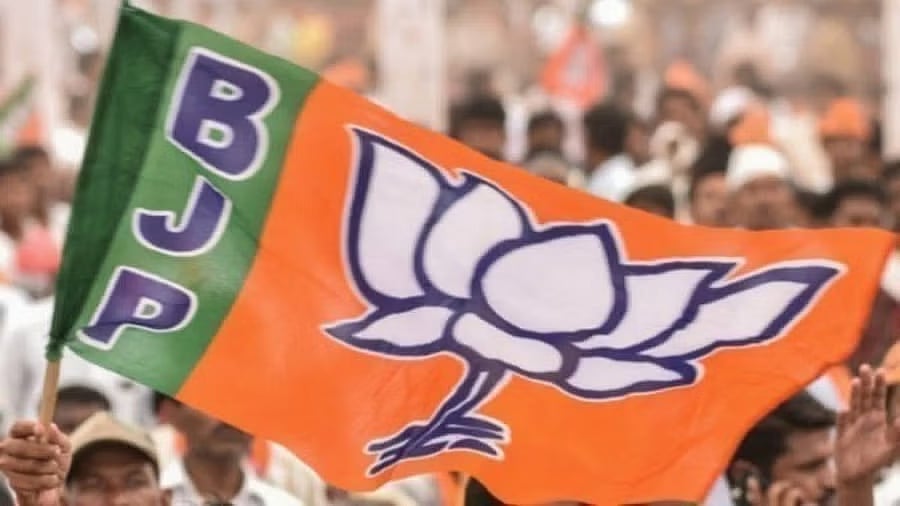
The BJP flag.
Credit: DH File Photo
The Bharatiya Janata Party’s Rajasthan unit appears to be on a sticky wicket, with some of its leaders stoking religious and caste sentiments in a bid to curry favour with the top brass—only to end up alienating key vote banks.
While the party has acted against such leaders— expelling senior leader Gyandev Ahuja and gagging Balmukund Acharya—the damage to its image as an inclusive party committed to ‘Sabka saath, sabka vikas’ is palpable.
On April 7, Ahuja, a former MLA from Ramgarh, purified a Ram temple in Alwar with Gangajal after a visit by Congress opposition leader Tikaram Jully, a Dalit. His act triggered protests, with critics accusing him of casteist behaviour.
Ahuja defended himself, claiming his act was against the Congress for its anti-Hindutva stance, not Jully. But the BJP’s disciplinary committee expelled him, citing a violation of the party’s pledge not to discriminate on caste, religion, or gender.
Observers see the party’s swift move as a damage-control step to retain Dalit support—particularly vital in Rajasthan. Dalits comprise 18% of the state’s population. In the 2023 Assembly elections, one of the BJP’s rallying points was ‘atrocities against Dalits’ by the Ashok Gehlot-led Congress government. The BJP won 22 out of 34, while Congress took 11. Ahuja has a history of incendiary remarks—once vowing to kill cow smugglers and praising lynch mobs.
In another flashpoint, BJP’s Hawa Mahal MLA Balmukund Acharya allegedly entered Jama Masjid in Johri Bazaar after the April 22 Pahalgam attack, placed a ‘Pakistan Murdabad’ poster, kicked it, and shouted ‘Jai Shree Ram’ slogans. He and his supporters continued sloganeering in the Walled City’s sensitive areas, leading to tensions between gathered crowds from both communities.
An FIR has been filed against him for hurting religious sentiments. Acharya, a first-time MLA, had won the Muslim-dominated constituency by just 974 votes. He quickly adopted a Hindutva hardline stance, criticising the sale of meat in public spaces, drawing backlash for targeting food and dietary practices.
Political observers say it seems the extreme stance taken by these pro-Hindutva image leaders has not gone down very well with BJP leadership, and Acharya has been reprimanded and asked to lie low.
In another instance, BJP MLA Gopal Sharma from Jaipur repeatedly called Congress legislator Rafique Khan a ‘Pakistani’ during an Assembly debate, drawing strong objections from the Opposition.
“The top brass must have issued a warning that these leaders should not go overboard. There is a feeling that the pro-Hindutva stance can work up to a certain limit but cannot go beyond; otherwise, the alienation of the minorities would be complete, resulting in a precarious situation for the BJP,” Narayan Bareth, a political analyst, told DH.
Muslims make up 9.07 % of Rajasthan’s population (2011 Census) and influence outcomes in at least 36 seats of the 200 Assembly seats, especially in 15 Muslim-dominated constituencies.
Many now believe the party’s tolerance for such extreme posturing may backfire. The prospect of a consolidated Dalit-Muslim vote bloc poses a significant electoral threat.
Sunil Bhargava, BJP Rajasthan’s Convener for Policy and Research, said the party has a clear policy against communal provocation and that leaders have been explicitly instructed to maintain harmony. State BJP president Madan Rathore reiterated the party’s zero-tolerance stand, saying, “Those who deliberately provoke unrest have no place in the BJP. Such acts are a betrayal of our principles and will be dealt with strictly.”
Still, sceptics question the sincerity of this crackdown. They say the party only reacts when things spiral out of control. Although they acknowledge the party seems to have reacted somewhat strongly this time, the saffron-clad MLA Acharya, who is clearly inspired by UP CM Yogi Adityanath, was given a free run till now.
Political observer and author Sunny Sebastian says, “It is unclear whether the party is really reining in the leaders or merely managing optics till tempers cool. One cannot understand whether these fringe elements, who have become the pro-Hindutva mouthpieces in Rajasthan, have the backing of the party or not. There is one powerful minister, Madan Dilawar, who also speaks in the same tone. There appears to be ambiguity in BJP’s actual stand over these divisive and polarising issues.”
Observers also point out that both Chief Minister Bhajan Lal and party president Rathore are first-timers--seen as mild-mannered and aligned with Delhi. Despite their inexperience, they have managed to bring around senior leader and whistleblower Kirori Lal Meena, who had refused to take charge as minister for nearly 10 months after being overlooked for the CM post. “Making Meena see reason and getting him to resume duties is a notable achievement for the Bhajan Lal-Rathore duo.”
Meanwhile, former CM Vasundhara Raje’s recent outburst over water shortages in her constituency may not have been spontaneous. The Jal Shakti Ministry has sought a report from the state government, and the episode has stirred internal murmurs in the party.
Factional internal politics continue, says Bareth. “There are multiple camps--Raje, Rajendra Rathore, Satish Poonia--all jostling for relevance. There is a leadership vacuum below the top level. Raje still commands mass support, but grooming of new leaders like deputy CM Diya Kumari is yet to gain traction.”